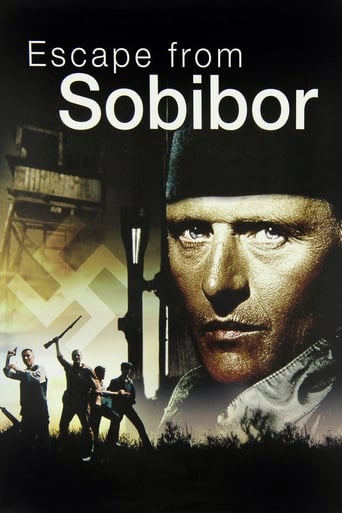"Escape from Sobibor," a 1987 television film produced by Zenith Entertainment and Rule/starger, stands as a poignant testament to human resilience and the will to survive against insurmountable odds. Set during World War II, the film meticulously recreates the harrowing events at the Sobibor extermination camp, located in Nazi-occupied Poland. Directed by Jack Gold and filmed in the United Kingdom and Yugoslavia, the movie captures the brutal reality of the Holocaust while focusing on the daring escape orchestrated by a group of prisoners led by Alexander Pechersky, portrayed compellingly by Rutger Hauer. The film's international production underscores a collaborative effort to bring this lesser-known story of resistance to a global audience. The narrative of "Escape from Sobibor" is both gripping and heart-wrenching, as it delves into the lives of the prisoners who, despite facing daily horrors, manage to plan and execute a mass escape. The film's strength lies in its character development, with standout performances from actors like Alan Arkin and Joanna Pacula, who bring depth and humanity to their roles. The meticulous attention to historical detail, combined with the emotional intensity of the performances, creates a powerful viewing experience that resonates with audiences. The film does not shy away from depicting the atrocities committed at Sobibor, yet it also highlights moments of courage and solidarity among the prisoners. "Escape from Sobibor" received critical acclaim upon its release, earning a Golden Globe for Best Miniseries or Television Film and garnering praise for its unflinching portrayal of the Holocaust. The film's success can be attributed to its ability to balance the grim realities of the camp with the inspiring story of resistance and survival. By focusing on the personal stories of the prisoners, the film humanizes the statistics of the Holocaust, making the audience connect with the characters on a deeply emotional level. The international collaboration between the United Kingdom and Yugoslavia added a layer of authenticity and cultural richness to the production. In the years following its release, "Escape from Sobibor" has been recognized as an important piece of Holocaust cinema, serving as both a historical document and a tribute to those who fought back against their oppressors. The film's enduring legacy lies in its ability to educate and inspire, reminding viewers of the atrocities of the past while celebrating the indomitable spirit of those who dared to hope and act in the face of death. Through its compelling storytelling and powerful performances, "Escape from Sobibor" continues to be a vital reminder of the human capacity for bravery and resistance.
Año1987
Duración169 minuto
GénerosDramaSuspenseBélica
Países de producciónUnited KingdomYugoslavia


